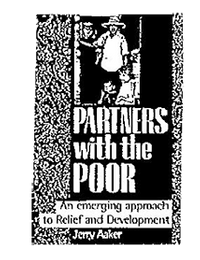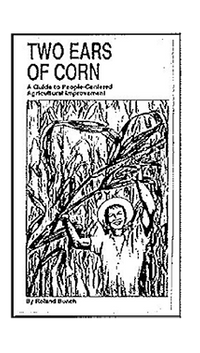- Technical Note: A Guide for Beginners in Small-Scale Tropical Agriculture, by Dr. Franklin W. Martin
- The Challenge of Agricultural Missions: Notes from ECHO's staff
- Book Review: Two Ears of Corn and other World Neighbors Materials
- Book Review: People in Rural Development
- Book Review: Partners With the Poor
- Book Review: Soybeans and the Kingdom of God
- Booklet Review: "Community Development and Christian Discipleship"

THE CHALLENGE OF AGRICULTURAL MISSIONS: Some Notes from ECHO's Staff. Doing agricultural missions is not an easy task. Many mission agencies with projects in evangelism, health, education, water, sanitation etc. hesitate to add agricultural projects to their program. Why? Because it is often much less clear what they should do to have a major impact in agriculture than it is in these other areas. It has been said that if you can provide clean drinking water and build latrines you take care of up to 80% of a village's health problems. Likewise, medicines already exist to treat most of the diseases in the developing world. But, if a community is "sick" because of poverty of farmers, it is much less clear what should be done.
Requirements for a satisfactory agricultural project include the following: It must involve no risk to local farmers who are already living on the edge. It must be something they are not already doing. It must make such a major difference that farmers will readily adapt the innovation.And, it must have a ready market (or be liked as food locally) if it involves sale of a product.
It's almost impossible to meet all of these criteria and some projects have failed miserably. But, there have been successes and more well prepared agricultural missionaries are needed. The following are a few ideas to keep inmind in preparation for a successful agricultural project. We've not elaborated on them and they are not all inclusive, but they are points that come up over and over again:

Be committed to the people and the work. Effective change takes time. Get to know the people and their needs. Live with them, learn their language and culture. Earn the right to help them. Cultivate your powers of observation; keep your eyes open. Go as a learner, see why people do things the way they do. (Most things are done for a reason, even if it seems foolish to you at first). Practice humility and listening. Admit when you are wrong, and expect good ideas to come from local counterparts. Be flexible, as you may become involved in more than you expected. You may find yourself involved in agriculture, regardless of your background in food production or skills and responsibilities in other areas.
Nationals, the people from the communities, must own the project. If they are not involved in every aspect from start to finish, your work will not effect lasting improvements. Use local resources and technologies which are appropriate. Do not do for the farmers what they can do for themselves. As far as possible, they should provide the labor and materials needed. Teach folks to teach others and do not make yourself indispensable. You will not be there forever. All this helps people keep their dignity, avoid dependency, and assure sustainability. Whenever possible work with the government and leadership, not against it.
All these help folks to keep their dignity, avoid dependency, and help assure sustainability. Whenever possible work with the government, not against it. There are a lot of technologies that have already proven themselves in a particular cultural and climatic setting. These are well worth a trial in similar situations. But nearly everything will require some adaptations to the local situation. Expect frustration. We once read that a farmer in the Philippines was able to multiply his cash income 15 times by planting disease-resistant tomatoes. But, he declined to plant them again because of social pressures from his less successful family and neighbors.
TWO EARS OF CORN AND OTHER WORLD NEIGHBORS MATERIALS.
The book is divided into 5 sections:
Here are some selected chapter headings:
- The program goals;
- the program area;
- planning;
- start slowly, start small;
- limit the technology;
- choosing an appropriate technology;
- small-scale experimentation;
- teaching the technology;
- employees;
- supporting services;
- evaluation and phase-out;
- multiplying our efforts;
- building institutions;
- integrated programs.
World Neighbors also has an excellent catalogue of filmstrips, videos, and printed materials designed to be easily understood by village audiences. The materials are practical and relevant for communities, and can be used for training extension workers. Many of the filmstrips are available in English, French, Spanish, Portuguese, and Hindi. Topics include specific areas in community development, health and nutrition, family planning, small animal raising, and agriculture, trees, and soil conservation. A few filmstrip titles from the latter category are "Planting cultivated pastures," "Fodder trees," "In-row tillage," "New dryland farming technology," "How to take soil samples," "Using the A-frame," "Quinua: protein for the highlands," "Growing mushrooms in tropical climates," and "The use of velvet bean to improve cropping land." A few projectors and accessories are available through them as well. Order the catalog from the above address.
PEOPLE IN RURAL DEVELOPMENT (228 pp.) by Peter Batchelor, veteran agricultural missionary in Africa, is an excellent, thoughtful book on Christ-centered agricultural development. Chapter titles include: People First, Getting Started, The Church and the Rural Poor, Good Stewards, Classroom and Fields, On the Job Training, Health the Key, An Appropriate Response, Whole Families, Workers, Ownership, Working Together, and God and Development. Contact the Paternoster Press/STL, P.O. Box 300, Kingstown Broadway, Carlisle, Cumbria CA3 0QS, UK; fax 0228 51 49 49.
 PARTNERS WITH THE POOR (158 pp.) by Jerry Aaker is subtitled "An emerging approach to Relief and Development." The author writes a personal journey through 25 years of international service with church agencies, tracing different trends in assistance, education, relief, and transformation. It is a fine resource for those who wish to examine different theories and issues in development. Order from Friendship Press, P.O. Box 37844, Cincinnati, OH 45222-0844, USA ($12.95).
PARTNERS WITH THE POOR (158 pp.) by Jerry Aaker is subtitled "An emerging approach to Relief and Development." The author writes a personal journey through 25 years of international service with church agencies, tracing different trends in assistance, education, relief, and transformation. It is a fine resource for those who wish to examine different theories and issues in development. Order from Friendship Press, P.O. Box 37844, Cincinnati, OH 45222-0844, USA ($12.95).
SOYBEANS AND THE KINGDOM OF GOD: AN APPROACH TO HOLISTIC MISSION (159 pp.) by Sharon Soper recounts her work with developing and promoting soybean flour while serving as a nurse in Bolivia. She discusses how holistic theology of God's kingdom, culture change, and value differences related to the technology of introducing soybeans into the diet. Available from Evangelical Mennonite Mission Conference, Box 52059, Niakwa P.O., Winnipeg, MB, CANADA R2M 5P9; fax (204) 256-7384; Cnd$13 in Canada, US$11 in USA, and US$13 International, postage included.
"COMMUNITY DEVELOPMENT AND CHRISTIAN DISCIPLESHIP: The Wedding of the Great Commandment and the Great Commission" by Gary Hipp offers a brief introduction to an effective relationship of Christian faith and works in a development situation. Contact Mission: Moving Mountains, P.O. Box 1168, Burnsville, MN 55337-1168, USA.

 ll as a good introduction for those coming to work with you. If you have not read a book such as this I would put it in the must read category. The needs around you are too great to ignore them just because you are not an "expert." But there is great wisdom in learning what you can before moving ahead. We arranged for a copy to be sent to John Douglas in Zambia after he asked our comments on some interesting agricultural projects that he was beginning. He wrote back, "I don't think I have ever read anything that had such a practical grasp of both village problems and solutions. I can already see that the book will make a difference in the way we carry out our program."
ll as a good introduction for those coming to work with you. If you have not read a book such as this I would put it in the must read category. The needs around you are too great to ignore them just because you are not an "expert." But there is great wisdom in learning what you can before moving ahead. We arranged for a copy to be sent to John Douglas in Zambia after he asked our comments on some interesting agricultural projects that he was beginning. He wrote back, "I don't think I have ever read anything that had such a practical grasp of both village problems and solutions. I can already see that the book will make a difference in the way we carry out our program."